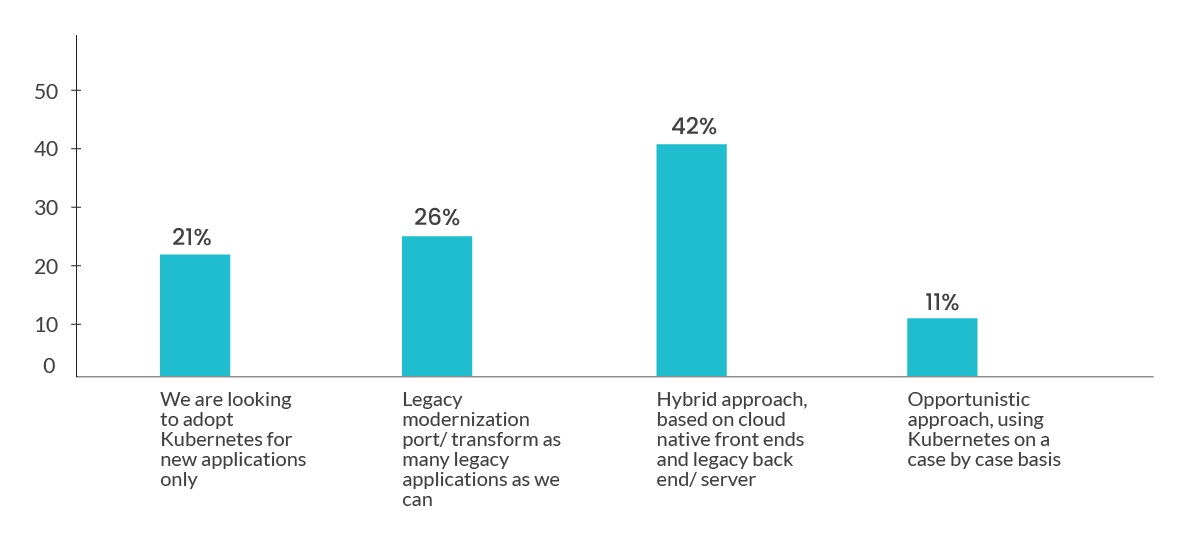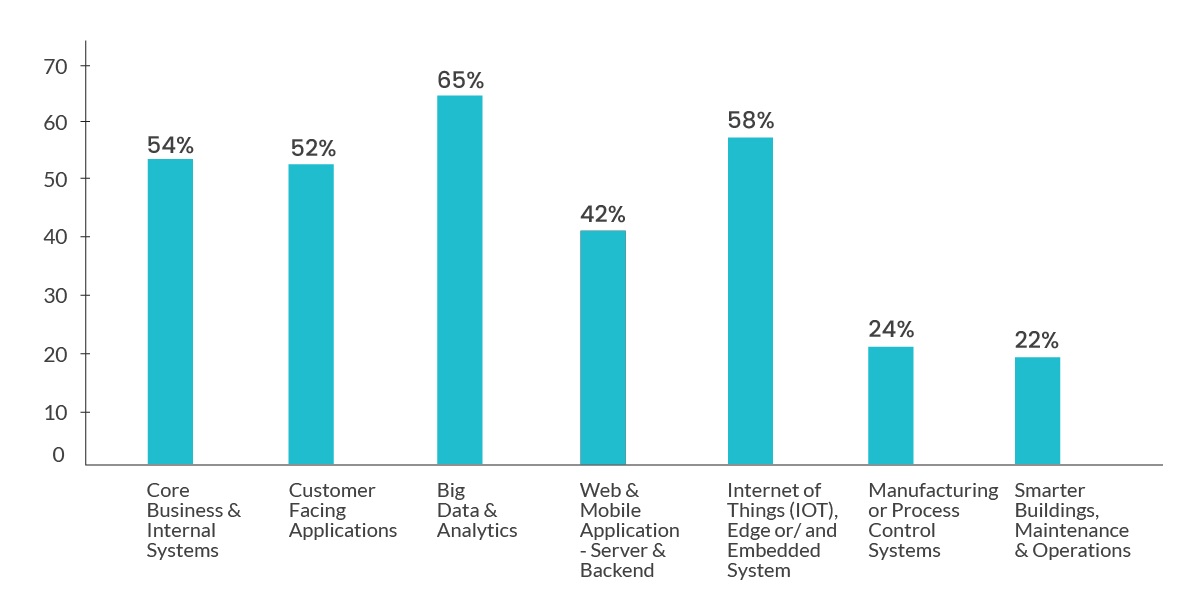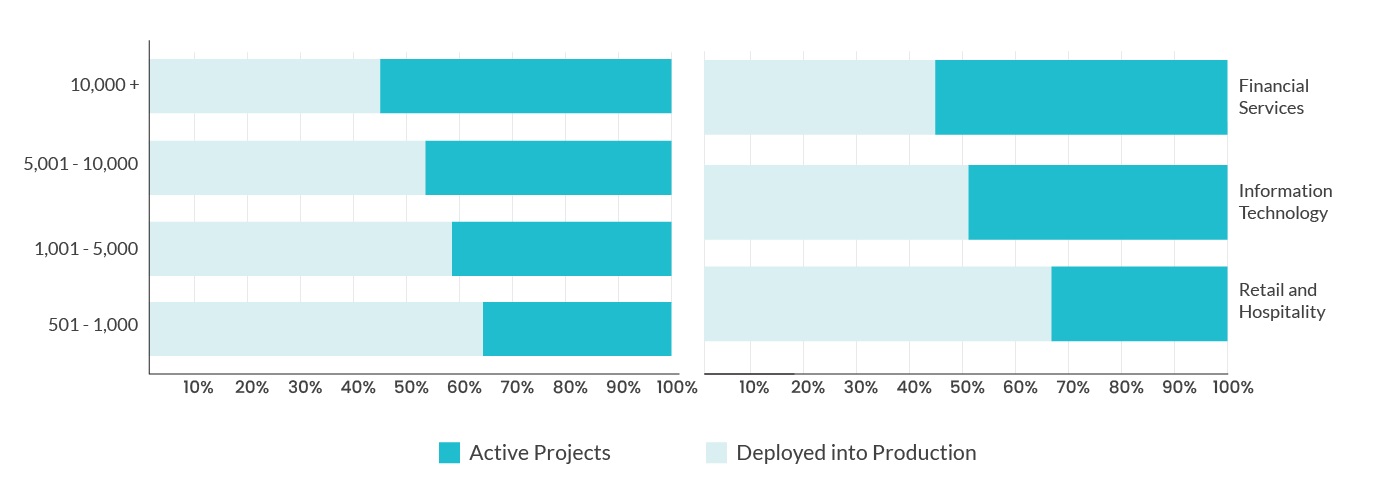GitLab announced the general availability of GitLab Duo with Amazon Q.
We're hearing a lot about Kubernetes right now (let's face it, who isn't?), but just how much of that attention is merited? We wanted to see if Kubernetes was being widely adopted, if so by whom, and how those using it were applying the technology to boost their businesses and systems. So we conducted a survey, to explore and unpack these questions and find out the state of Kubernetes in the enterprise today.
We received more than 1,000 responses to our survey, of which 301 respondents are actively using Kubernetes in some form. This is an important statistic in itself: to put it simply, Kubernetes is here, and its use is growing. Nonetheless, while most (if not all) tech-influenced organizations might be talking about Kubernetes, only about a third are actually doing it. This blog outlines who those organizations are, how they are using Kubernetes, why they are using it, and what challenges they foresee from its application in the next two years.
1: A high proportion of organizations are still in the early stages of adoption
It's clear from the figures we've already stated that the majority of those using Kubernetes are in early stages of adoption. Of the 301 active organizations that have taken it beyond a pilot stage, 55% are using it for one or more specific projects, and 45% have moved to a full production environment.
This proportion is unsurprising considering the nascent nature of the platform, and indicates organizations are exploring what it can do for their businesses and how to deploy it effectively. Nonetheless, that's still a lot of production projects already using Kubernetes.

2: Kubernetes offers a great way to leverage legacy
Interestingly, just 21% of organizations are considering using Kubernetes for new applications only, whereas 42% are taking a hybrid approach, building new front ends onto legacy systems. Kubernetes creates an opportunity to align older applications with today's business needs, breathing new life into existing databases and services, and increasing their lifetime value.
A further 26% are considering how to use Kubernetes to port/transform existing applications, looking to move on from their legacy systems and making the most of the new capabilities Kubernetes offers. Overall, we can see how Kubernetes needs to take account of existing systems and needs, whether re-facing or re-architecting.

3: Kubernetes is being used in a wide variety of applications
Big Data and analytics is the most popular use case for Kubernetes, according to 64% of respondents. This shows how distributed data sources are increasingly important to modern enterprise and the flexibility of Kubernetes systems can allow better utilization of these sources.
It is also being considered for a wide variety of applications - from IoT and Edge (58%), to customer-facing apps (52%) and core business and internal systems (53%).

4: Banking and larger organizations are more advanced in their adoption
Our survey results show that banking and larger organizations are more advanced in their adoption of Kubernetes, with 55% of organizations with more than 10,000 seats deploying Kubernetes into a production environment. Compare this to the smallest companies (under 1,000 seats) where just 36% have deployed to production.
This makes sense – larger companies, as well as having the resources to build production capabilities quickly, will have more opportunities to apply new technologies such as Kubernetes across their business interests.
In terms of sectors, Banking leads the way with 55% deploying Kubernetes to full production. This beats out technology companies (46%) and retail and hospitality (33%). This could be attributed to banking's large legacy systems benefiting from new front-ends, bringing better usability to old data management systems. Plus of course banks do like to show themselves as leading edge!

Industry News
Perforce Software and Liquibase announced a strategic partnership to enhance secure and compliant database change management for DevOps teams.
Spacelift announced the launch of Saturnhead AI — an enterprise-grade AI assistant that slashes DevOps troubleshooting time by transforming complex infrastructure logs into clear, actionable explanations.
CodeSecure and FOSSA announced a strategic partnership and native product integration that enables organizations to eliminate security blindspots associated with both third party and open source code.
Bauplan, a Python-first serverless data platform that transforms complex infrastructure processes into a few lines of code over data lakes, announced its launch with $7.5 million in seed funding.
Perforce Software announced the launch of the Kafka Service Bundle, a new offering that provides enterprises with managed open source Apache Kafka at a fraction of the cost of traditional managed providers.
LambdaTest announced the launch of the HyperExecute MCP Server, an enhancement to its AI-native test orchestration platform, HyperExecute.
Cloudflare announced Workers VPC and Workers VPC Private Link, new solutions that enable developers to build secure, global cross-cloud applications on Cloudflare Workers.
Nutrient announced a significant expansion of its cloud-based services, as well as a series of updates to its SDK products, aimed at enhancing the developer experience by allowing developers to build, scale, and innovate with less friction.
Check Point® Software Technologies Ltd.(link is external) announced that its Infinity Platform has been named the top-ranked AI-powered cyber security platform in the 2025 Miercom Assessment.
Orca Security announced the Orca Bitbucket App, a cloud-native seamless integration for scanning Bitbucket Repositories.
The Live API for Gemini models is now in Preview, enabling developers to start building and testing more robust, scalable applications with significantly higher rate limits.
Backslash Security(link is external) announced significant adoption of the Backslash App Graph, the industry’s first dynamic digital twin for application code.
SmartBear launched API Hub for Test, a new capability within the company’s API Hub, powered by Swagger.
Akamai Technologies introduced App & API Protector Hybrid.













